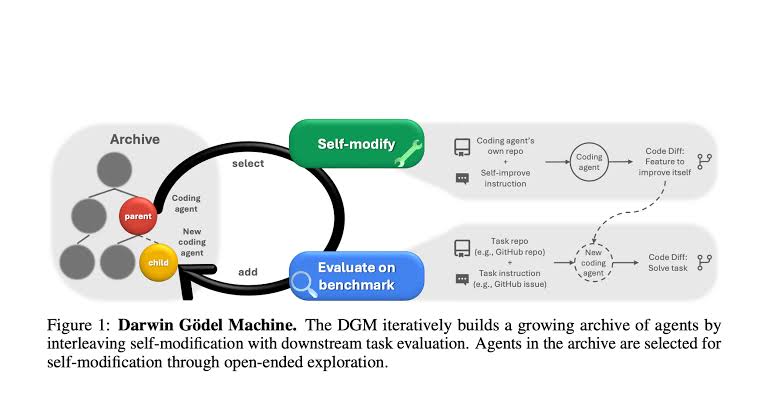Jason Voorhees
Say cheese
- Joined
- May 15, 2020
- Posts
- 79,841
- Reputation
- 233,079
Just a few weeks ago. A new paper explaining the Darwin-Gödel machine was published. It is a theoretical model of a self-improving artificial intelligence system proposed by computer scientist Jürgen Schmidhuber(Jew) It is considered revolutionary because it combines evolutionary principles, Gödel's self-referential logic, and algorithmic optimization into a single framework that could, in theory, create a truly self-improving Al.
It consists of:
1. A problem-solving program (the "worker") that performs tasks.
2. A proof-searcher that looks for formal proofs that modifying the code will improve performance.
3. A meta-theorem verifier, based on Gödel's incompleteness ideas, that ensures consistency and correctness of self-improvements.
Why Is It Revolutionary?
Self-Improvement with Guarantees: Unlike black-box neural networks, it can formally prove that each self-modification is beneficial.
Avoids Catastrophic Errors: It won't rewrite itself randomly-it only changes itself when it can prove that the change is safe and beneficial.
Ultimate General Learner: In theory, it can optimize not just for a single task, but become more intelligent over time, adapting to new problems without external reprogramming.
Bridges Logic and Learning: It merges symbolic logic (proofs) with learning-based models, unifying two historically separate Al approaches
Limitations
-Extremely slow in practice: Proving theorems about code improvements can take massive time.
-Still theoretical: No real-world implementation exists (yet) that is both scalable and efficient.
-Resource-intensive: It's constrained by the limits of computation and proof search complexity
TLDR for lowiqcels
The Darwin-Gödel Machine is a concept for a future Al that can rewrite and improve itself-but only if it can prove that the changes will make it smarter and safer. Think of it as a super-intelligent robot that upgrades its own brain, but always double-checks with math before doing anything risky


It consists of:
1. A problem-solving program (the "worker") that performs tasks.
2. A proof-searcher that looks for formal proofs that modifying the code will improve performance.
3. A meta-theorem verifier, based on Gödel's incompleteness ideas, that ensures consistency and correctness of self-improvements.
Why Is It Revolutionary?
Self-Improvement with Guarantees: Unlike black-box neural networks, it can formally prove that each self-modification is beneficial.
Avoids Catastrophic Errors: It won't rewrite itself randomly-it only changes itself when it can prove that the change is safe and beneficial.
Ultimate General Learner: In theory, it can optimize not just for a single task, but become more intelligent over time, adapting to new problems without external reprogramming.
Bridges Logic and Learning: It merges symbolic logic (proofs) with learning-based models, unifying two historically separate Al approaches
Limitations
-Extremely slow in practice: Proving theorems about code improvements can take massive time.
-Still theoretical: No real-world implementation exists (yet) that is both scalable and efficient.
-Resource-intensive: It's constrained by the limits of computation and proof search complexity
TLDR for lowiqcels
The Darwin-Gödel Machine is a concept for a future Al that can rewrite and improve itself-but only if it can prove that the changes will make it smarter and safer. Think of it as a super-intelligent robot that upgrades its own brain, but always double-checks with math before doing anything risky


Last edited:

